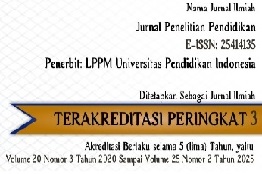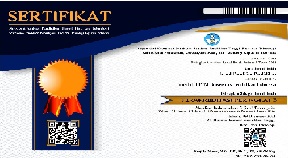Vocational High School Teachers' Beliefs on Teaching Speaking Skills in English as a Foreign Language
Abstract
Keywords
Full Text:
PDFReferences
Abbaspour, F. (2016). Speaking competence and its components: A review of the literature. International Journal of Research in Linguistics, Language Teaching, and Testing, 1(4).
Amiryousefi, M. (2015). Iranian EFL learners' and teachers' beliefs about the usefulness of vocabulary learning strategies. SAGE Open, 1-10. DOI: 10.1177/2158244015581382.
Bell, T. R. (2005). Behaviors and attitudes of effective foreign language teachers: result of a questionnaire study. Foreign Language Annals, 38(2).
Buss, L. (2015). Beliefs and practices of Brazilian EFL teachers regarding pronunciation. Language Teaching Research, 1-19. DOI: 10.1177/1362168815574145
Direktorat Pembinaan SMK. (2017). Strategi implementasi revitalisasi smk melalui bilingual learning ecosystem. Jakarta: Direktorat Pembinaan SMK.
Damayanti, Annisa. (2019). Using games to improve students; speaking skill: a classroom action research. [Master thesis]. Universitas Pendidikan Indonesia, Bandung.
Farrell, T. S. C., Ives, J. (2015). Exploring teacher beliefs and classroom practices through reflective practice: a case study. Language Teaching Research, 19(5), 1-17.
Farrell, T. S. C., & Yang, D. (2017). Exploring an EAP teacher's beliefs and practices in teaching L2 speaking: a case study. RELC Journal, 1-14. DOI: 10.1177/003688217730144
Fives, H., & Buehl, M. M. (2016). Teachers' beliefs, in the context of policy reform. Policy Insight from the Behavioral and Brain Sciences, 3(1), 114-121. DOI: 10.1177/2372732215623554
Gareca, B. C., & Gui, M. (2018). Chinese and American EFL teachers' beliefs about curricular and pedagogical practices: cross-cultural similarities and differences. Language and Intercultural Communication. DOI: 10.1080/14708477.2018.1456546
Garrity, S., & Guerra, A. W. (2015). A cultural communities approach to understanding head start teachers' beliefs about language use with dual language learners: implication for practice. Contemporary Issues in Early Childhood, 16(3), 241-256. DOI: 10.1177/1463949115600027
Hamied, F.A. (2017). Research methods: a guide for first-time researchers. Bandung: UPI Press.
Hopkins, M. (2014). Beliefs in context: Understanding language policy implementation at a system level. Educational Policy, 1-33. DOI: 10.1177/0895904814550073
Khan, H., Howell, K., Glinert, E., Holding, L., Swain, C., Burrowbridge, A., & Roper, M. (2007). How to build serious games. Communications of the ACM, 50 (7).
Lu, C., & Lavandez, M. (2014). Native Chinese‐speaking k–12 language teachers' beliefs and practices. Foreign Language Annals, 47(4).
Mak, S. H. (2011). Tensions between conflicting beliefs of an EFL teacher in teaching practice. RELC Journal, 42(1), 53-67.
McMillan, J. H., & Schumacher, S. (2014). Research in education: evidence based inquiry. Arizona: Pearson Education.
Moini, M. R. (2008). The impact of EFL teachers' cognition on teaching foreign language grammar. Pazhuhesh-e Zabanha-ye Khareji, 49.
Nespor, J. (1987). The role of beliefs in the practice of teaching. Journal of Curriculum Studies, 19, 317-328.
Nuraini, K. (2016). The barriers of teaching speaking English for EFL learners. ELLITE: Journal of English Language, Literature, and Teaching, 1(1).
Pajares, F. (1992). Teachers' beliefs and educational research: Cleaning up the messy construct. Review of Educa¬tional Research, 62(3), 307-332.
Pan, L., & Block, D. (2011). English as a 'global language' in China: An investigation into learners' and teachers' language beliefs. System, 39, 391–402.
Pettit, S. K. (2011). Teachers' beliefs about English language learners in the mainstream classroom: A review of the literature. International Multilingual Research Journal, 5(2), 123–127.
Richards, J., & Lockhart, C. (2009). Reflective teaching in second language classrooms. Chinese edition. Cambridge Language Edition.
Rohmah, G. N., Fitriyah, U., & Hanifiyah, L. (2019). Best Practices on Islamic Values Integration at Madrasah English Classes: Teachers' Practices in Contextualizing the Values. JEELS (Journal of English Education and Linguistics Studies), 6(2), 269-283
Savitri, A. S. (2013). The use of language games to improve the students' speaking ability of class VII a of SMP Ma'arif terpadu Muntilan in the academic year of 2012/2013. [Doctoral dissertation]. Yogyakarta State University, Yogyakarta.
Silverman, D. (2004). Qualitative research: theory, method, and practice. London: Sage Publications.
Stake, R. E. (1995). The Art of Case Study Research. Thousand Oaks, CA: SAGE Publications.
Supriya, D. (2018). Improving Students' Speaking Ability through Play Scripts. KnE Social Science, 156-166. DOI: 10.1850.2/kss.b3i4.1928.
Thornbury, S. (2005). How to teach speaking. U.K.: Pearson.
Zhang, B. (2013). An analysis of spoken language and written language and how they affect English language learning and teaching. Journal of Language Teaching & Research, 4(4).
DOI: https://doi.org/10.17509/jpp.v20i3.28932
Refbacks
- There are currently no refbacks.
Copyright (c) 2020 Jurnal Penelitian Pendidikan
ISSN: p.1412-565X e.2541-4135
Jurnal Penelitian Pendidikan (JPP), Universitas Pendidikan Indonesia 
This work is licensed under a Creative Commons Attribution-ShareAlike 4.0 International License


